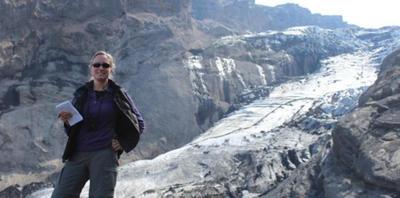Witze Receives 2016 AGU Journalism Award
Witze Receives 2016 AGU Journalism Award

Alexandra Witze XII BS '92 received the 2016 David Perlman Award for Excellence in Science Journalism–News at the American Geophysical Union Fall Meeting Honors Ceremony, held on 14 December 2016 in San Francisco, Calif. The award recognizes "a journalist for a news story or series in any medium except books that makes information about the Earth and space sciences accessible and interesting to the general public." Witze now works as a science journalist and is currently a contributing correspondent for Nature and Science News specializing in the Earth and planetary sciences.
Read this story at EOS
It’s not exactly a secret that Alex Witze has a thing for the most restless parts of the planet. She and her husband, Jeff Kanipe, toiled for several years and spent part of their savings to trek around Iceland to research their book Island on Fire, which describes the great Laki eruption of 1783. For Nature, Alex has reported from the site of the devastating Wenchuan earthquake in China, headed into the Pacific on a ship to learn about undersea volcanoes, and shadowed the seismologists who track earthquakes across the world.
In early 2015, Alex decided she wanted to write about a different kind of instability: earthquakes triggered by humans. Oklahoma and Texas had been hit by increasing numbers of earthquake swarms, and seismologists had accumulating evidence that this activity was caused by the injection of wastewater into deep rock formations, typically as a by-product of oil and gas production. Seismologists were set to explore this issue at a Seismological Society of America meeting in April, and Alex decided the time was right for a story.
But unlike many reporters, who might focus on the latest study, Alex decided to write a broader story by touring Oklahoma, the epicenter of this seismic activity. She drove 10 hours from her home to visit with some of the Oklahoma researchers who would soon present their data to the seismological meeting. She went to a town hall gathering, where residents, scientists, and state regulators talked about the issue that was threatening their livelihoods and lives. She explored the brick architecture and gas pipelines that were not built to withstand strong quakes. She also took care to show how important the oil and gas industry has been to Oklahoma and how everybody has struggled to manage a risk associated with a key source of revenue.
Then, after a marathon drive back home, Alex quickly wrote a beautiful story with her trademark efficiency. What makes this story stand out is that Alex used the opportunity of the scientific meeting to investigate how the results of research fit into a complex public discussion that is roiling a state. Her superb instincts were prescient. In September, Oklahoma suffered one of the strongest quakes in state history, forcing regulators to shut down fluid injection wells in the region. For anyone wanting to understand the issue, Alex’s award-winning story would be an excellent place to start.
—Rich Monastersky, Nature Magazine, Washington, D. C.
Response
I’m honored to receive the American Geophysical Union’s award for news reporting, which is named after David Perlman, the science editor of the San Francisco Chronicle, who has been an inspiration throughout my career. Dave’s hardworking, hard-nosed journalism, which he has practiced since the 1950s, is a model for any reporter in any decade. Thanks to Lauren Morello for deftly editing the story, to Matt Crenson for commissioning it, and to Rich Monastersky for writing the citation.
I would like to thank my husband, Jeff Kanipe, above all. He did not blink when I said we should go to Oklahoma to report on induced seismicity, and he suggested lines of reporting and places to visit that enhanced the final piece. Both of us, however, missed the moderate earthquake we should have felt on the trip: I was walking across the campus of Oklahoma State University when it happened and he was in the car, both of us insulated from ground movement by our own motions. Jeff’s personal and professional support has enabled so much of what I have been able to accomplish, for which I am eternally grateful.
—Alexandra Witze, Nature Magazine, Boulder, Colo.
Citation: AGU (2017), Alexandra Witze receives 2016 David Perlman Award for Excellence in Science Journalism–News, Eos, 98, doi:10.1029/2017EO064543. Published on 19 January 2017.